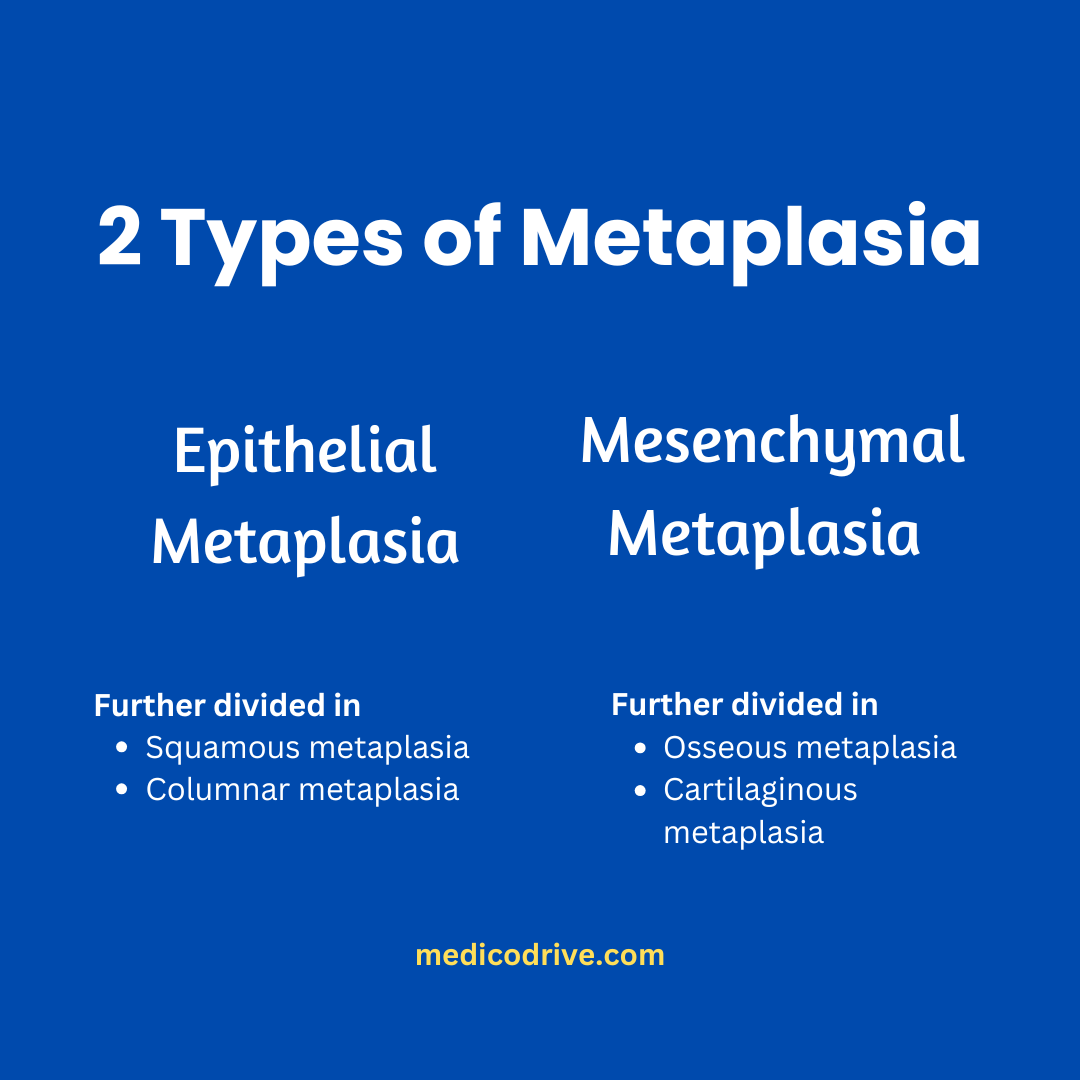Medically Reviewed By Dr Ashish Panwar
Metaplasia is a reversible change in which one adult cell type which maybe epithelial or mesenchymal, is replaced by another adult cell type, usually in response to abnormal stimuli, and often reverts back to normal on removal of stimulus. If the stimulus of the change persists for the long time, this epithelial metaplasia may get transform into Cancer (severe state of metaplasia). It is mainly divided into 2 types, epithelial metaplasia and mesenchymal metaplasia. (Also check pathology important topics).

Definition Of Metaplasia
Metaplasia is defined as a reversible change of one type of epithelial or mesenchymal adult cells to another type of adult epithelial or mesenchymal cells. It has 2 types, epithelial and mesenchymal.
In other words, metaplasia is change in the phenotype of differentiated cells, often in response to chronic irritation or stimuli, which makes cells better able to withstand the stress, may result in reduced functions or increased propensity for malignant transformation or cancer.
Eat these 9 foods to keep your brain healthy
World Malaria Day 2025 Theme, Poster
Types of Metaplasia
According to classical pathological classification, metaplasia is broadly differentiate into 2 types, epithelial and mesenchymal metaplasia.
1. Epithelial Metaplasia
- This one is the mostly found type of the metaplasia.
- The metaplastic change may be patchy or diffuse and usually results in replacement by stronger but less well specialized epithelium.
- This is more prone to infection.
- Epithelial transformation seen in this type of metaplasia, so depending on the type of transformation epithelial metaplasia is further divided into 2 types, squamous and columnar.
a. Squamous metaplasia
This is more common type, mainly changes seen in:-
- Bronchus – in chronic smokers
- Uterine endocervix – in prolapse of the uterus and in old age
- Gallbladder – in chronic cholecystitis with cholelithiasis
- Prostate – in chronic prostatitis and oestrogen therapy
- Renal pelvis – in chronic infection and stones
- Urinary bladder – in chronic infection and stones
- In vitamin A deficiency: Since vitamin A is essential for normal epithelial differentiation, its deficiency may also induce squamous metaplasia.
b. Columnar metaplasia
- It is rare, only few conditions in which it get transformed into columnar metaplasia.
- Intestinal metaplasia in healed chronic gastric ulcer.
- In Barrett’s oesophagus: In this, change of normal squamous epithelium to columnar epithelium is seen.
- In cervical erosion

2. Mesenchymal Metaplasia
Metaplasia may also occur in mesenchymal cells but in these situations it is generally a reaction to some pathologic alteration and not an adaptive response to stress. For example, bone is occasionally formed in soft tissues, particularly in foci of injury. Examples of mesenchymal is…
a. Osseous metaplasia
Formation of bone in fibrous tissue, cartilage and myxoid tissue. examples of osseous metaplasia is,
- In the scar of chronic inflammation
- In soft tissue
- Mönckeberg’s medial calcificsclerosis (in arterial wall in old age)
- In cartilage of larynx and bronchi
b. Cartilaginous metaplasia
Seen in healing fractures, due to improper mobility.
Also read, World Health Day 2025 Theme
Causes of Metaplasia
As mentioned above, Metaplasia is a reversible change in which one adult cell type which maybe epithelial or mesenchymal, is replaced by another adult cell type, which is due to chronic issues or environmental factors like:
- Smoking
- Vitamin A deficiency
- Gastroesophageal reflex disease (GERD)
- Helicobacter pylori
- Alcohol
- High salt intake
- Pancreatitis
- Human papilloma virus (HPV)
- Diet and lifestyle
Treatment of Metaplasia
Metaplasia is a reversible process that can be treated because it has not yet reached the chronic stage. But its treatment depends on its type, and can be detected only after consulting a doctor. So if you see or feel any of these symptoms, then consult a doctor soon so that it can be prevented from progressing.
Reference to this article
While writing this article I took help from some books on pathology, to which I would like to give credit. Text Book of Pathology by Harsh Mohan and Robbins Basic Pathology.
This article is written and reviewed by Dr. Ashish Panwar.

Hello, I am Dr. Ashish. I have lot of experience in medical field and education, I have gained lot of knowledge in my entrance exam life and medical studies which I want to share with everyone so that I can help more and more people.
2 thoughts on “From Squamous to Columnar: Understanding Metaplasia in Clinical and Exam Contexts”